- Home
- Peter S. Beagle
The Last Unicorn Page 9
The Last Unicorn Read online
Page 9
“Your name!” the man who had first spoken demanded of Schmendrick. He was middle-aged or more, as were they all, dressed in fine, dull clothing.
“Gick,” said the magician, because of the swords.
“Gick,” mused the man with the pistols. “An alien name.”
“Naturally,” the first man said. “All names are alien in Hagsgate. Well, Mr. Gick,” he went on, lowering his sword slightly to the point where Schmendrick’s collarbones converged, “if you and Mrs. Gick would kindly tell us what brings you skulking here—”
Schmendrick found his voice at that. “I hardly know the woman!” he roared. “My name is Schmendrick, Schmendrick the Magician, and I am hungry and tired and unpleasant. Put those things away, or you’ll each have a scorpion by the wrong end.”
The four men looked at one another. “A magician,” said the first man. “The very thing.”
Two of the others nodded, but the man who had tried to capture the unicorn grumbled, “Anyone can say he’s a magician these days. The old standards are gone, the old values have been abandoned. Besides, a real magician has a beard.”
“Well, if he isn’t a magician,” the first man said lightly, “he’ll wish he were, soon enough.” He sheathed his sword and bowed to Schmendrick and Molly. “I am Drinn,” he said, “and it is possibly a pleasure to welcome you to Hagsgate. You spoke of being hungry, I believe. That’s easily remedied—and then perhaps you will do us a good turn in your professional capacity. Come with me.”
Grown suddenly gracious and apologetic, he led them toward a lighted inn, while the three other men followed close behind. More townsfolk came running up now, streaming eagerly from their houses with their own dinners half-eaten and their tea left steaming; so that by the time Schmendrick and Molly were seated, there were nearly a hundred people wedged together on the inn’s long benches, jamming into the doorway and falling through the windows. The unicorn, unnoticed, paced slowly after: a white mare with strange eyes.
The man named Drinn sat at the same table with Schmendrick and Molly, chattering as they ate, and filling their glasses with a furry black wine. Molly Grue drank very little. She sat quietly looking at the faces around her and noting that none seemed any younger than Drinn’s face, though a few were much older. There was a way in which all the Hagsgate faces were very much alike, but she could not find it.
“And now,” Drinn said when the meal was over, “now you must permit me to explain why we greeted you so uncivilly.”
“Pish, no need.” Schmendrick chuckled. The wine had made him chuckly and easy, and had brightened his green eyes to gold. “What I want to know is the reason for the rumors that have Hagsgate full of ghouls and werewolves. Most absurd thing I ever heard of.”
Drinn smiled. He was a knotty man with a turtle’s hard, empty jaws. “It’s the same thing,” he said. “Listen. The town of Hagsgate is under a curse.”
The room was suddenly very still, and in the beery light the faces of the townsfolk looked as tight and pale as cheese. Schmendrick laughed again. “A blessing, you mean. In this bony kingdom of old Haggard’s, you are like another land altogether—a spring, an oasis. I agree with you that there’s enchantment here, but I drink to it.”
Drinn stopped him as he raised his glass. “Not that toast, my friend. Will you drink to a woe fifty years old? It is that long since our sorrow fell, when King Haggard built his castle by the sea.”
“When the witch built it, I think.” Schmendrick wagged a finger at him. “Credit where it’s due, after all.”
“Ah, you know that story,” Drinn said. “Then you must also know that Haggard refused to pay the witch when her task was completed.”
The magician nodded. “Aye,” and she cursed him for his greed—cursed the castle, rather. But what had that to do with Hagsgate? The town had done the witch no wrong.”
“No,” Drinn replied. “But neither had it done her any good. She could not unmake the castle—or would not, for she fancied herself an artistic sort and boasted that her work was years ahead of its time. Anyway, she came to the elders of Hagsgate and demanded that they force Haggard to pay what was due her. ‘Look at me and see yourselves,’ she rasped. ‘That’s the true test of a town, or of a king. A lord who cheats an ugly old witch will cheat his own folk by and by. Stop him while you can, before you grow used to him.’” Drinn sipped his wine and thoughtfully filled Schmendrick’s glass once more.
“Haggard paid her no money,” he went on, “and Hagsgate, alas, paid her no heed. She was treated politely and referred to the proper authorities, whereupon she flew into a fury and screamed that in our eagerness to make no enemies at all, we had now made two.” He paused, covering his eyes with lids so thin that Molly was sure he could see through them, like a bird. With his eyes closed, he said, “It was then that she cursed Haggard’s castle, and cursed our town as well. Thus his greed brought ruin upon us all.”
In the sighing silence, Molly Grue’s voice came down like a hammer on a horseshoe, as though she were again berating poor Captain Cully. “Haggard’s less at fault than you yourselves,” she mocked the folk of Hagsgate, “for he was only one thief, and you were many. You earned your trouble by your own avarice, not your king’s.”
Drinn opened his eyes and gave her an angry look. “We earned nothing,” he protested. “It was our parents and grandparents whom the witch asked for help, and I’ll grant you that they were as much to blame as Haggard, in their way. We would have handled the matter quite differently.” And every middle-aged face in the room scowled at every older face.
One of the old men spoke up in a voice that wheezed and miaowed. “You would have done just as we did. There were crops to harvest and stock to tend, as there still are. There was Haggard to live with, as there still is. We know very well how you would have behaved. You are our children.”
Drinn glowered him down, and other men began to shout spitefully, but the magician quieted them all by asking, “What was the curse? Could it have anything to do with the Red Bull?”
The name rang coldly, even in the bright room, and Molly felt suddenly lonely. On an impulse, she added her own question, though it had nothing to do with the conversation. “Have any of you ever seen a unicorn?”
It was then that she learned two things: the difference between silence and utter silence; and that she had been quite right to ask that question. The Hagsgate faces tried not to move, but they did move. Drinn said carefully, “We never see the Bull, and we never speak of him. Nothing that concerns him can be any business of ours. As for unicorns, there are none. There never were.” He poured the black wine again. “I will tell you the words of the curse,” he said. He folded his hands before him, and began to chant.
You whom Haggard holds in thrall,
Share his feast and share his fall.
You shall see your fortune flower
Till the torrent takes the tower.
Yet none but one of Hagsgate town
May bring the castle swirling down.
A few others joined in as he recited the old malediction. Their voices were sad and far, as though they were not in the room at all but were tumbling in the wind high over the inn’s chimney, helpless as dead leaves.
What is it about their faces? Molly wondered. I almost know. The magician sat silently by her, rolling his wineglass in his long hands.
“When those words were first spoken,” Drinn said, “Haggard had not been long in the country, and all of it was still soft and blooming—all but the town of Hagsgate. Hagsgate was then as this land has become: a scrabbly, bare place where men put great stones on the roofs of their huts to keep them from blowing away.” He grinned bitterly at the older men. “Crops to harvest, stock to tend! You grew cabbages and rutabagas and a few pale potatoes, and in all of Hagsgate there was but one weary cow. Strangers thought the town accursed, having offended some vindictive witch or other.”
Molly felt the unicorn go by in the street, the
n turn and come back, restless as the torches on the walls, that bowed and wriggled. She wanted to run out to her, but instead she asked quietly, “And afterward, when that had come true?”
Drinn answered, “From that moment, we have known nothing but bounty. Our grim earth has grown so kind that gardens and orchards spring up by themselves—we need neither to plant nor to tend them. Our flocks multiply; our craftsmen become more clever in their sleep; the air we breathe and the water we drink keep us from ever knowing illness. All sorrow parts to go around us—and this has come about while the rest of the realm, once so green, has shriveled to cinders under Haggard’s hand. For fifty years, none but he and we have prospered. It is as though all others had been cursed.”
“‘Share his feast and share his fall,’” Schmendrick murmured. “I see, I see.” He gulped another glass of the black wine, and laughed. “But old King Haggard still rules, and will until the sea overflows. You don’t know what a real curse is. Let me tell you my troubles.” Easy tears suddenly glittered in his eyes. “To begin with, my mother never liked me. She pretended, but I knew—”
Drinn interrupted him, and just then Molly realized what was strange about the folk of Hagsgate. Every one of them was well and warmly dressed, but the faces that peered out of their fine clothes were the faces of poor people, cold as ghosts and too hungry to eat. Drinn said, “‘Yet none but one of Hagsgate town may bring the castle swirling down.’ How can we delight in our good fortune when we know that it must end, and that one of us will end it? Every day makes us richer, and brings us one day nearer to our doom. Magician, for fifty years we have lived leanly, avoided attachments, untied all habits, readying ourselves for the sea. We have taken not a moment’s joy in our wealth—or in anything else—for joy is just one more thing to lose. Pity Hagsgate, strangers, for in all the wretched world there can be no town more unhappy.”
“Lost, lost, lost,” the townsfolk whimpered. “Misery, misery we.” Molly Grue stared wordlessly at them, but Schmendrick said respectfully, “That’s a good curse, that’s a professional job. I always say, whatever you’re having done, go to an expert. It pays in the long run.”
Drinn frowned, and Molly nudged Schmendrick. The magician blinked. “Oh. Well, what is it you wish of me? I must warn you that I am not a very skillful sorcerer, but I will be glad to lift this curse from you, if I can.”
“I had not taken you for any more than you are,” Drinn answered, “but such as you are, you should do as well as any. I think we will leave the curse the way it is. If it were lifted we might not become poor again, but we would no longer grow steadily richer, and that would be just as bad. No, our real task is to keep Haggard’s tower from falling, and since the hero who will destroy it can only come from Hagsgate, this should not be impossible. For one thing, we allow no strangers to settle here. We keep them away, by force if we must, but more often by guile. Those dark tales of Hagsgate that you spoke of—we invented them ourselves, and spread them as widely as we could to make certain that we would have few visitors.” He smiled proudly with his hollow jaws.
Schmendrick propped his chin on his knuckles and regarded Drinn with a sagging smile. “What about your own children?” he asked. “How can you keep one of them from growing up to fulfill the curse?” He looked around the inn, sleepily studying every wrinkled face that looked back at him. “Come to think of it,” he said slowly, “are there no young people in this town? How early do you send children to bed in Hagsgate?”
No one answered him. Molly could hear blood creaking in ears and eyes, and skin twitching like water plucked by the wind. Then Drinn said, “We have no children. We have had none since the day that the curse was laid upon us.” He coughed into his fist and added, “It seemed the most obvious way of foiling the witch.”
Schmendrick threw back his head and laughed without making a sound, laughed to make the torches dance. Molly realized that the magician was quite drunk. Drinn’s mouth disappeared, and his eyes hardened into cracked porcelain. “I see no humor in our plight,” he said softly. “None at all.”
“None,” Schmendrick gurgled, bowing over the table and spilling his wine. “None, pardon me, none, none at all.” Under the angry gaze of two hundred eyes, he managed to recover himself and reply seriously to Drinn. “Then it would seem to me that you have no worries. None that would worry you, anyway.” A small whee of laughter sneaked out between his lips, like steam from a teakettle.
“So it would seem.” Drinn leaned forward and touched Schmendrick’s wrist with two fingers. “But I have not told you all the truth. Twenty-one years ago, a child was born in Hagsgate. Whose child it was, we never knew. I found it myself, as I was crossing the marketplace one winter’s night. It was lying on a butcher’s block, not crying, although there was snow, but warm and chuckling under a comforter of stray cats. They were all purring together, and the sound was heavy with knowledge. I stood by the strange cradle for a long time, pondering while the snow fell and the cats purred prophecy.”
He stopped, and Molly Grue said eagerly, “You took the child home with you, of course, and raised it as your own.” Drinn laid his hands palm up on the table.
“I chased the cats away,” he said, “and went home alone.” Molly’s face turned the color of mist. Drinn shrugged slightly. “I know the birth of a hero when I see it,” he said. “Omens and portents, snakes in the nursery. Had it not been for the cats, I might have chanced the child, but they made it so obvious, so mythological. What was I to do—knowingly harbor Hagsgate’s doom?” His lip twitched, as though a hook had set in it. “As it happens, I erred, but it was on the side of tenderness. When I returned at sunrise, the baby had vanished.”
Schmendrick was drawing pictures with his finger in a puddle of wine, and might have heard nothing at all. Drinn went on. “Naturally, no one ever admitted to leaving the child in the marketplace, and though we searched every house from cellar to dovecote, we never found it again. I might have concluded that wolves had taken the brat, or even that I had dreamed the whole encounter, cats and all—but for the fact that on the very next day a herald of King Haggard’s came riding into town, ordering us to rejoice. After thirty years of waiting, the king had a son at last.” He looked away from the look on Molly’s face. “Our foundling, incidentally, was a boy.”
Schmendrick licked the tip of his finger and looked up. “Lír,” he said thoughtfully. “Prince Lír. But there was no other way to account for his appearance?”
“Not likely,” Drinn snorted. “Any woman that would marry Haggard, even Haggard would refuse. He gave out the tale that the boy was a nephew, whom he graciously adopted on the death of his parents. But Haggard has no relatives, no family. There are those who say that he was born of an overcast, as Venus was born out of the sea. No one would give King Haggard a child to raise.”
The magician calmly held out his glass, and filled it himself when Drinn refused. “Well, he got one somewhere, and good for him. But how could he have come by your little cat-baby?”
Drinn said, “He walks in Hagsgate at night, not often, but now and then. Many of us have seen him—tall Haggard, gray as driftwood, prowling alone under an iron moon, picking up dropped coins, broken dishes, spoons, stones, handkerchiefs, rings, stepped-on apples; anything, everything, no reason to it. It was Haggard who took the child. I am as certain of it as I am certain that Prince Lír is the one who will topple the tower and sink Haggard and Hagsgate together.”
“I hope he is,” Molly broke in. “I hope Prince Lír is that baby you left to die, and I hope he drowns your town, and I hope the fish nibble you bare as corncobs—”
Schmendrick kicked her ankle as hard as he could, for the listeners were beginning to hiss like embers, and a few were rising to their feet. He asked again, “What is it you wish of me?”
“You are on your way to Haggard’s castle, I believe.” Schmendrick nodded. “Ah,” Drinn said. “Now, a clever magician would find it simple
to become friendly with Prince Lír, who is reputed to be a young man of eagerness and curiosity. A clever magician might be acquainted with all manner of odd potions and powders, poppets and philters, herbs and banes and unguents. A clever magician—mind you, I said ‘clever,’ no more—a clever magician might be able, under the proper circumstances…” He let the rest drift away unspoken, but no less said.
“For a meal?” Schmendrick stood up, knocking his chair over. He leaned on the table with both hands, breathing harshly. “Is that the going rate these days? Dinner and wine the price of a poisoned prince? You’ll have to do better than that, friend Drinn. I wouldn’t do in a chimneysweep for such a fee.”
Molly Grue gripped his arm, crying, “What are you saying?” The magician shook her hand away, but at the same time he lowered one eyelid in a slow wink. Drinn leaned back in his chair, smiling. “I never haggle with a professional,” he said. “Twenty-five pieces of gold.”
They haggled for half an hour, Schmendrick demanding a hundred gold pieces, and Drinn refusing to offer more than forty. At last they settled at seventy, half to be paid then and half upon Schmendrick’s successful return. Drinn counted out the money on the spot from a leather pouch at his belt. “You’ll spend the night in Hagsgate, of course,” he said. “I would be pleased to put you up myself.”
But the magician shook his head. “I think not. We will go on to the castle, since we’re so near it now. The sooner there, the sooner back, eh?” And he grinned a crafty and conspiratorial grin.
“Haggard’s castle is always dangerous,” Drinn warned. “But it is never more dangerous than at night.”

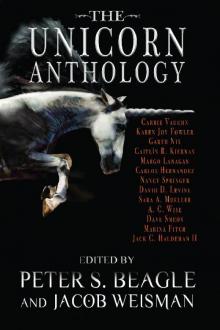 The Unicorn Anthology.indb
The Unicorn Anthology.indb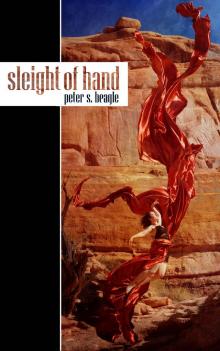 Sleight of Hand
Sleight of Hand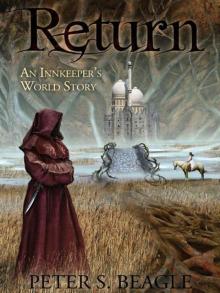 Return
Return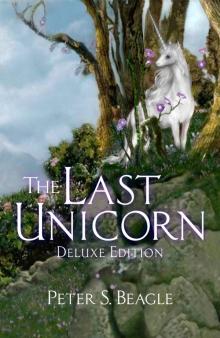 The Last Unicorn
The Last Unicorn Two Hearts
Two Hearts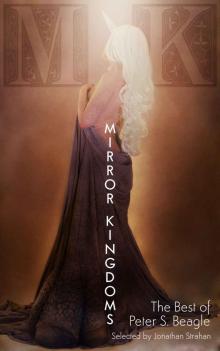 Mirror Kingdoms: The Best of Peter S. Beagle
Mirror Kingdoms: The Best of Peter S. Beagle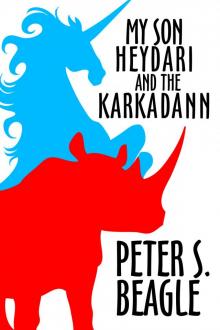 My Son Heydari and the Karkadann
My Son Heydari and the Karkadann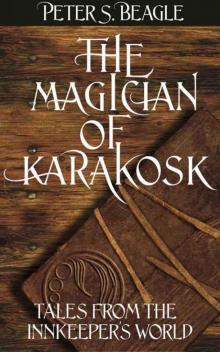 The Magician of Karakosk, and Other Stories
The Magician of Karakosk, and Other Stories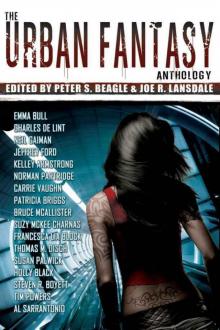 The Urban Fantasy Anthology
The Urban Fantasy Anthology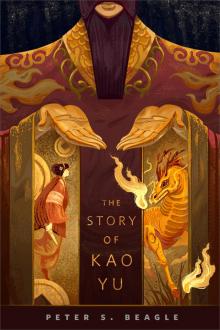 The Story of Kao Yu
The Story of Kao Yu The Karkadann Triangle
The Karkadann Triangle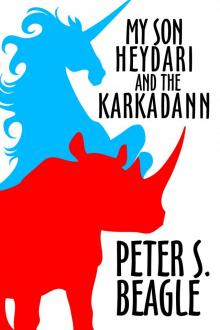 My Son and the Karkadann
My Son and the Karkadann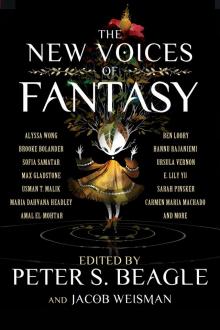 The New Voices of Fantasy
The New Voices of Fantasy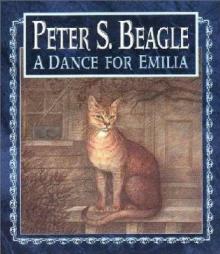 A Dance for Emilia
A Dance for Emilia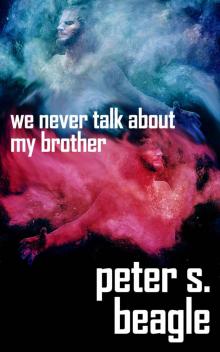 We Never Talk About My Brother
We Never Talk About My Brother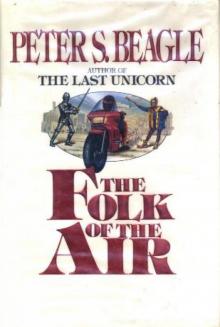 The Folk Of The Air
The Folk Of The Air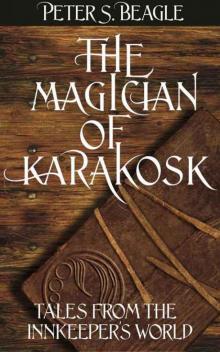 The Magician of Karakosk: Tales from the Innkeeper's World
The Magician of Karakosk: Tales from the Innkeeper's World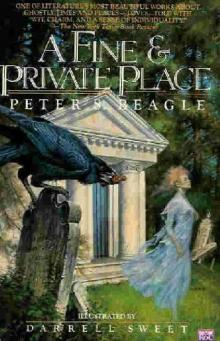 A Fine and Private Place
A Fine and Private Place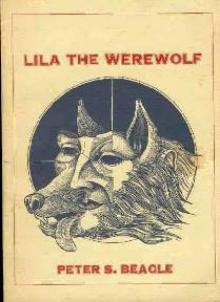 Lila The Werewolf
Lila The Werewolf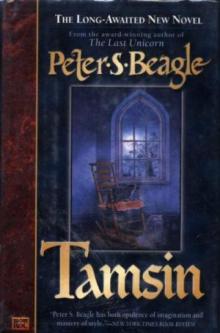 Tamsin
Tamsin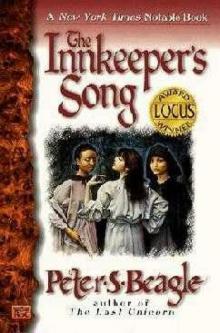 Innkeeper's Song
Innkeeper's Song